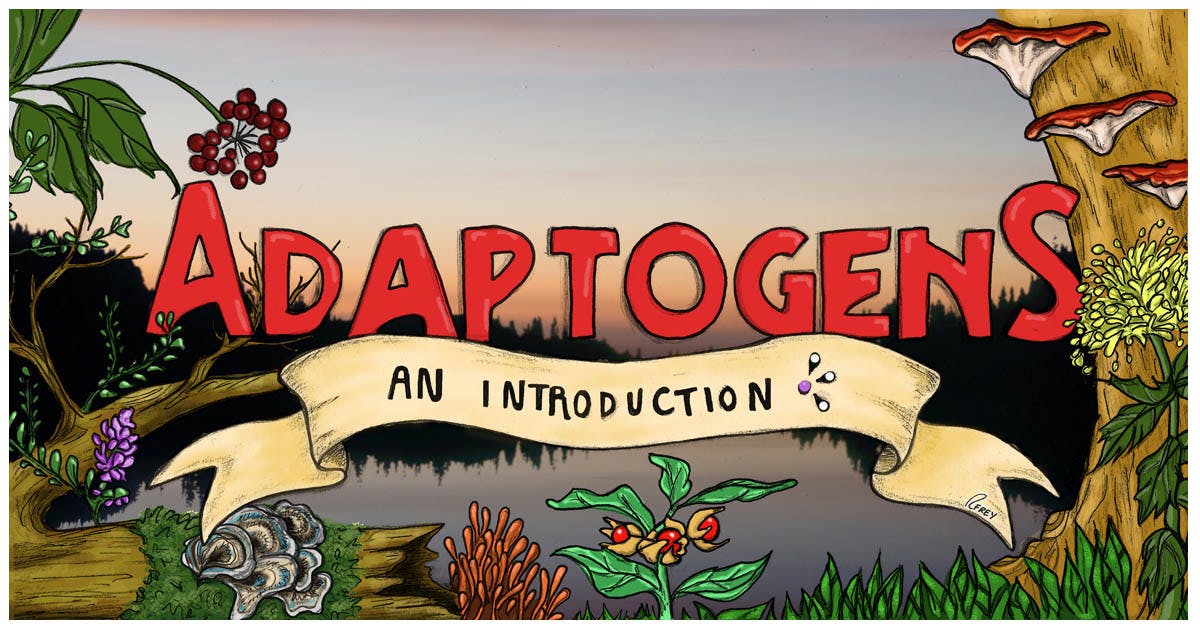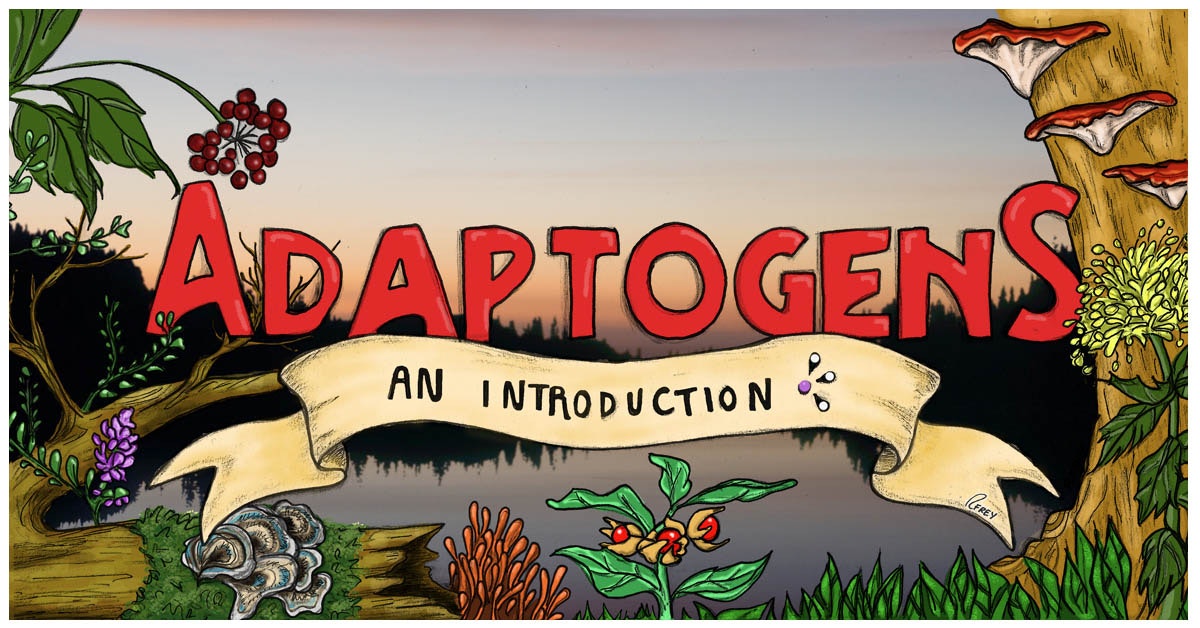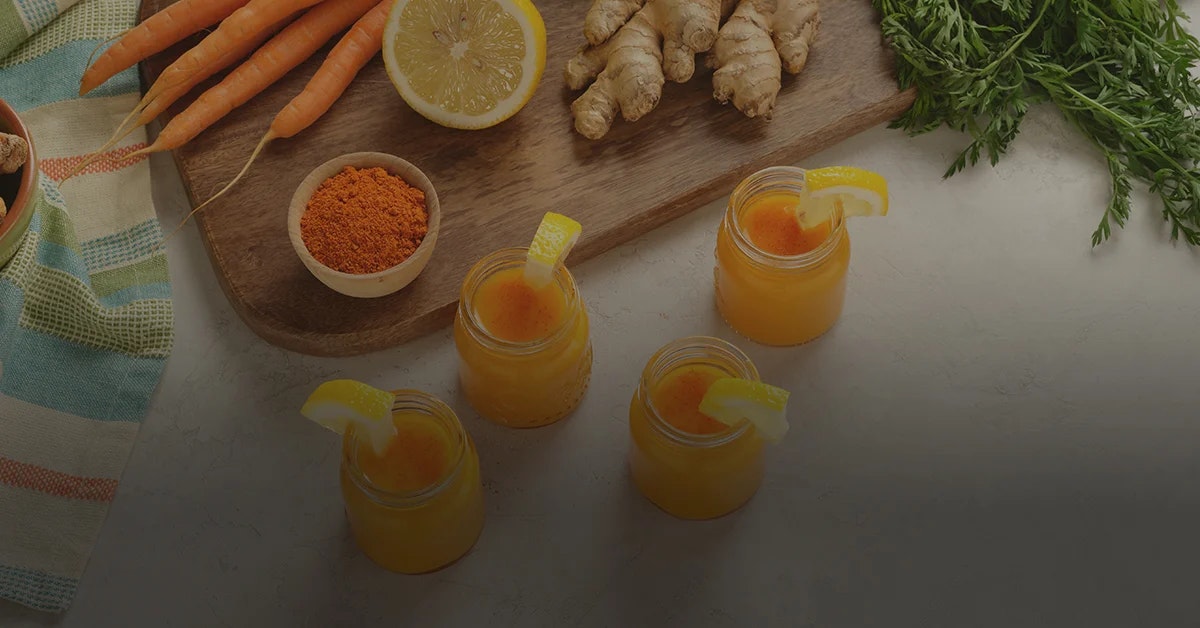Welcome to the World of Adaptogens!
Adaptogens. It’s a term we have been hearing a lot lately, but what does it really mean? And what does it have to do with juice and smoothies? If these are some of the questions you have (and even if they’re not), you’re in for a real treat! Join me over the next few months as we explore the world of adaptogens in this educational blog series.
In each post we will dive deep into a featured adaptogen, covering its history and background, the science and health benefits, where to get it, how to use it, and even some recipes!
- What are Adaptogens?
- Why should we Use Adaptogens?
- Sourcing Adaptogens
- How to Use Adaptogens
- What's Next?

What Are Adaptogens?
Adaptogens are plants that promote balance by helping the body adapt and resist stress.
Certain plants have compounds that give them the ability to resist stressful environments by adapting. When we utilize these plants, they have the unique ability to ‘adapt’ their function according to the specific needs within our bodies.
From medicinal mushrooms to herbs and roots, adaptogens have been used for centuries in traditional Ayurvedic and Chinese healing.
Dr. Israel Brekhman (aka “Father of Adaptogens”), a respected research scientist and medical doctor, devoted his whole career to the study of adaptogenic herbs and their effects on health and wellness. Brekhman and his colleagues defined adaptogens as natural plant substances that:
- Increase the body’s ability to cope with internal and external stresses
- Exhibit stimulating effects after both single-time use and prolonged use, leading to increased working capacity and mental performance under stressful and fatigue-inducing conditions
- Normalize the functions of the body
- Are safe and have no negative side effects

Why Should We Use Adaptogens?
Adaptogens are experiencing a resurgence in mainstream wellness, and for good reasons.
Adaptogens not only help us improve our response to stress, but they also support our mood, energy levels, and immune function. These protective agents can help us manage stress and find balance in a natural way, increasing our overall health and wellness. Plus, they are a great way to supercharge your already-healthy juices, smoothies, and bowls!
Stress Is a Major Contributor to Illness
Medical research estimates as much as 90 percent of illness and disease is stress-related, with emotional stress being a major contributing factor to the six leading causes of death in the United States: cancer, coronary heart disease, accidental injuries, respiratory disorders, cirrhosis of the liver, and suicide.1
We live in a world where heightened intensity is the norm, and we are constantly bombarded with compounded stressors, which can cause our bodies to be in a constant state of “fight or flight”. When our body is in this chronic stress state and stress hormones remain elevated for too long, our immune system begins to deteriorate. Our body makes fewer immune cells and the immune cells that it does make are less mobile and less effective.
Now more than ever, it is extremely important to find ways to help our bodies adapt and resist stress.
Here is a short list of some popular adaptogens and their health benefits to give you a sneak peek at just how amazing they are:
- Ashwagandha: Commonly known as “Indian Ginseng”, ashwagandha is one of the most important herbs of Ayurveda, used for its abilities to fight stress and increase stamina. It is also found to be effective against depression, preventing and slowing loss of brain function, and stopping cell growth in certain cancers.2
- Chaga: This nutrient-dense “King of Medicinal Mushrooms” is known to improve the body’s response to stress, boost immunity, increase energy, reduce inflammation, promote healthy skin, fight and prevent cancer, and is used as a remedy for a plethora of other ailments.3,4
- Cordyceps: This potent mushroom stimulates energy to fight fatigue and is also known to boost athletic performance by increasing endurance. Studies also show that it enhances aerobic capacity and respiratory function. It is anti-inflammatory and high in antioxidants, giving it powerful anti-aging properties.5,6,7
- Ginseng: The ginseng plant has energizing properties that help the body handle stress and contains high levels of compounds that reduce inflammation, improve memory, and boost immunity.8
- Reishi: This powerful mushroom has relaxing properties that help relieve stress and anxiety, and promote feelings of well-being. It also is known to reduce inflammation, prevent cancer, and boost immunity.9,10
- Tulsi (Holy Basil): Originating in India, tulsi is a wonderful herb with relaxing properties that can calm anxiety and reduce the effects of stress. It is also rich in antioxidants and compounds that reduce inflammation, boost energy, and support the immune system.11
You can find more boosters and adaptogens in Chef Ari’s book The Juicing Companion. Get it here! The Juicing Companion

Sourcing Adaptogens
There are many different ways to source adaptogens, whether you decide to forage them, grow your own, or purchase from a supplier.
If you choose, as most people do, to purchase your adaptogens, you will want to get them from a source you trust. If you are unfamiliar with who that might be, look for organic, high-quality brands. These brands can usually be found at your local health food store or online apothecaries.
Here is a list of some of my favorite suppliers and brands, most of them offer bulk/wholesale pricing:
- Goodnature Marketplace
- Terrasoul Superfoods
- Apothékary
- Mary Ruth’s Organics
- Mountain Rose Herbs
- Organic India
- Traditional Medicinals
How To Use Adaptogens
Adaptogens come in many forms, and sometimes the same adaptogen is available in a variety of different forms. How do we know which one to use?
From teas to extracts and whole plants to powders, many times the form you choose will depend on how you want to incorporate it into your regimen.
Form | Works well with... |
Powders | smoothies, smoothie bowls, plant-based milks, raw snack bars, baked goods |
Extracts | juices, smoothies, plant-based milks, most applications |
Whole (dried, fresh) | teas, restorative broths, and soup stocks |
What’s Next?
The articles to follow will be all about specific adaptogens, so make sure you are on our mailing list to get them sent directly to your inbox. I will also post all the articles here as they get published, that way you can bookmark this page and have access to the whole series.
The World of Adaptogens Blog Series
- Chaga Mushroom: Benefits, Uses & Recipes
- Ashwagandha: Benefits, Uses & Recipes
- Holy Basil: Benefits, Uses & Recipes
- Reishi Mushroom: Benefits, Uses & Recipes
What adaptogens are your favorite and why? Which ones would you like to learn more about? Let me know in the comments below!
References:
- Life Event, Stress and Illness, https://www.ncbi.nlm.nih.gov/pmc/articles/PMC3341916/
- An Overview on Ashwagandha: A Rasayana (Rejuvenator) of Ayurveda, https://www.ncbi.nlm.nih.gov/pmc/articles/PMC3252722/
- Anticancer activity of subfractions containing pure compounds of Chaga mushroom (Inonotus obliquus) extract in human cancer cells , https://synapse.koreamed.org/articles/1051060
- Chaga mushroom extract inhibits oxidative DNA damage in human lymphocytes as assessed by comet assay, https://pubmed.ncbi.nlm.nih.gov/15630179/
- Cordyceps militaris improves tolerance to high intensity exercise after acute and chronic supplementation, https://www.ncbi.nlm.nih.gov/pmc/articles/PMC5236007/
- Randomized double-blind placebo-controlled clinical trial and assessment of fermentation product of Cordyceps sinensis (Cs-4) in enhancing aerobic capacity and respiratory function of the healthy elderly volunteers, https://link.springer.com/article/10.1007/BF02836405
- Protective effects on mitochondria and anti-aging activity of polysaccharides from cultivated fruiting bodies of Cordyceps militaris, https://pubmed.ncbi.nlm.nih.gov/21061463/
- Herbal Medicine: Biomolecular and Clinical Aspects. 2nd edition., Chapter 8, https://www.ncbi.nlm.nih.gov/books/NBK92776/
- Cellular and molecular mechanisms of immuno-modulation by Ganoderma lucidum, https://pubmed.ncbi.nlm.nih.gov/16230843/
- Herbal Medicine: Biomolecular and Clinical Aspects. 2nd edition., Chapter 9, https://www.ncbi.nlm.nih.gov/books/NBK92757/
- Tulsi – Ocimum sanctum: A herb for all reasons, https://www.ncbi.nlm.nih.gov/pmc/articles/PMC4296439/
The information shared in this post is a combination of my personal experience, research, and knowledge as a certified holistic health coach, and is intended for educational purposes only. These statements have not been evaluated by the FDA and are not intended to diagnose, treat, cure, or prevent any disease or to be considered a substitute for professional medical advice.



Comment